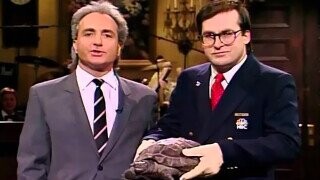Young Bob Odenkirk ‘Had No F---ing Clue’ What He Was Doing at ‘SNL’

When Bob Odenkirk’s 24-year-old son Nate started making noise about getting a writing job on a prestigious comedy show like Saturday Night Live, you’d best believe the old man shared some cautionary tales. On Tig Notaro’s Don’t Ask Tig podcast, the senior Odenkirk remembered his own days at SNL as a 25-year-old writer: “I was unsure of myself. It was hard. It was existentially dangerous. I had feelings of ‘I should erase myself.’”
Click right here to get the best of Cracked sent to your inbox.
Erase yourself? Geez, that sounds serious. “I was too young when I got hired at SNL,” he told Notaro. “That was not a good thing. That could’ve gone wrong. That could’ve gone so wrong. It came this close so many times to going so wrong. You gotta believe me. And it’s hard for kids to believe you when you say, ‘I had no f---ing clue what I was doing and I was scared outta my wits for years.’”
Don't Miss
The Mr. Show co-creator has expressed his misgivings about his SNL education before, a time that left him feeling “out of place and resentful,” according to his memoir Comedy Comedy Comedy Drama. “Sadly, as a writer I was a waste of bagels!” he wrote. “I was trying too hard, but the more I failed, the more I tried. It’s a sick cycle that afflicts many a fresh SNLer.”
Odenkirk’s frustrations at Saturday Night Live will sound familiar to anyone who’s heard other unhappy cast members and writers complain about their tenure on the show: The work schedule is insane, especially the “stay up all night” part. There’s no time to rework pretty good sketches into great ones. No one gives you advice on how to get started, much less tips on how to excel. And how exactly are you supposed to deal with the inspiration for Dr. Evil, Lorne Michaels? “I basically had a huge chip on my shoulder, and mix that in with Lorne’s traditional intimidation and it’s not good,” Odenkirk explained in the oral history Live From New York. “I didn’t respond to the way he likes to approach young performers and set himself up as some kind of very distant, strange Comedy God.”
Better experiences at Second City and working on stage shows with Robert Smigel and Conan O’Brien convinced Odenkirk it was time to move on from SNL. “Basically, I had to realize that I wanted what every comedy writer wants,” he wrote in Comedy Comedy Comedy Drama. “My own damn show.”
But that doesn’t mean Odenkirk didn’t get a comedy education. “I owe SNL so much,” he concluded in his memoir. “I had quietly, excruciatingly learned the components of a good sketch and developed a sense of structure that gave me confidence and led to all my best sketch work still to come. Lorne had subsidized my education in sketch writing, and now he would see none of the benefits. Poor fella. I took my diploma and ran.”